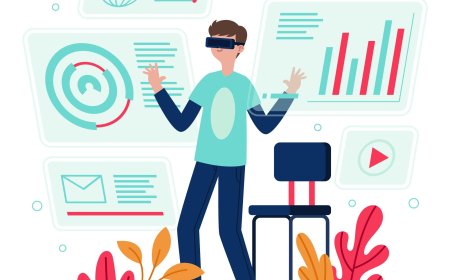Why 2025 Is a Defining Year for Tech, Jobs, and Us
In short, thoughtful regulation can help ensure that AI doesn’t just make things faster or cheaper—but better for all of us.
Ive been following the AI conversation for years, but 2025 feels different. Everywhere I lookX threads, financial sites, policy briefingstheres a growing chorus: AI can transform industries, but only if we get regulation right. I find myself scrolling through debates written by both technophiles and skeptics, thinking about how these decisions will impact not just big firms, but the everyday jobs I care aboutand yes, even my downtime, like when Im out searching for smoke shops near me and mulling over where the tech conversation heads next.
Using the PAS frameworkProblem, Agitation, SolutionI want to break down why AI regulation matters this year, how it could reshape work in finance and real estate, and what it means for all of us who use techand, occasionally, decide where to buy vapes while pondering the future of work.
? The Problem: AI Is Everywhere, But So Are the Questions
AI isn't tomorrow's headlineit's today's reality. In finance, algorithms underwrite loans and detect fraud. In real estate, platforms estimate values based on image recognition and market data. Customer service bots handle everything from banking requests to realty queries, and that's just scratching the surface. Yet with all this momentum, major concerns are surfacing:
-
Job displacement: Operators, brokers, bank tellersmany roles are now being automated.
-
Bias and fairness: Algorithms trained on flawed data can reinforce inequality.
-
Lack of accountability: Whos responsible when AI model valuations are drastically off?
-
Regulatory patchwork: Different countries and states are moving at different speeds, leaving firms in uncertainty.
Around the world, regulators are calling for clarity: certifications, transparency, liability rules. And while the tech industry worries that overregulation could stifle innovation, others argue its essential for trust and protection.
? The Agitation: Why It Hits Close to Home
This isnt academic. The effects on jobs and services are already rolling in:
Career Anxiety
Ive seen friends in mortgage companies and appraisal firms growing uneasy. AI-powered valuation tools can churn out comparative market analyses in secondsa job that used to take days. While some firms embrace AI-assisted workflows, others are downsizing entire teams. Its tempting to think, Ive always done Xbut in 2025, even seasoned roles are being questioned.
-
Routine tasks are disappearing
-
Employers expect digital AI fluency
-
Career transitions are becoming a necessity
Public Trust Is Wavering
When AI makes mistakeslike undervaluing a property, rejecting a loan unfairly, or mishandling customer servicethe fallout is real. It erodes faith in institutions and prompts consumer hesitation. A platform might save a company time and money, but if it becomes known for unfair outcomes, users will walk away. Ive seen that happen firsthand in online finance forums and local community groups.
Regulatory Whiplash
Last-minute policy shifts or inconsistent guidelines can paralyze progress. One month, AI adoption surges under relaxed rules. The next, a new bill demands all real estate platforms explain their AI logicand suddenly, firms are backpedaling. Its keeping executives up at night and employees unsure of whats next.
-
Companies over-cautious of compliance risk
-
Innovation timelines stretch
-
Smaller firms struggle to adapt
? The Solution: How Im Staying Informed and Ready
I dont have a crystal ball, but heres what Im doing to ride this waveprofessionally and personally:
1. Watch the Policy Pulse
I check X and reputable economic sites daily to follow AI regulatory developmentsespecially bills involving transparency, bias audits, and liability. Being ahead of the curve helps me assess risks before they hit my work or investments.
2. Upskill for AI-Hybrid Roles
Roles arent going awaytheyre evolving. Im taking online classes to learn AI workflows and ethics in finance and real estate. By positioning myself as a Swiss-army toolsomeone who understands both the domain and the dataIm making myself more adaptable. The future favors hybrids, not humans vs. machines.
3. Support Ethical AI Practices
I aim to work with firms that publish AI impact assessments or voluntarily open their models to third-party audits. Transparency isnt just legalits human. That open stance is what I look for when I check out new tech providers, whether Im researching loan platforms or browsing listings.
4. Keep a Human-Centered Lens
My guiding question: Does the AI help people? If a tool speeds up mortgage processing but leaves customers confused, thats a problem. I stay vocal about maintaining empathy in tech designbecause data isnt everything.
? My Two-Cent VerdictAnd What It Means for Us
AI regulation isnt some remote policy fight. It shapes hiring, service standards, fairness, compensation, and even consumer trust. As someone invested in both the financial and real estate worldsand yes, occasionally browsing for tech at the moment Im about to buy vapesI believe we need a balanced approach:
-
Smart regulation that promotes transparency but doesnt freeze innovation
-
Continuous education for existing professionals to stay relevant
-
Ethical oversight to ensure AI builds trust, not backlash
Were at crossroads: embrace technology thoughtfully, or rush ahead and lose what makes services human.
Key Takeaways
-
AI is reshaping jobs in finance and real estate rapidly.
-
The public demands transparency, fairness, and accountability.
-
Regulation can guide usif its well-designed and flexible.
-
We must meet technology halfway: hybrid skills + ethical implementation.
-
Staying informed, adaptable, and human-focused is how we stay applicable in 2025and beyond.
So if youre watching AI evolve, browsing market updates, or even walking into a vape shop to decompress, remember: this is our moment to shape how AI serves usnot the other way around.
Lets stay tuned, stay engaged, and stay human.

































